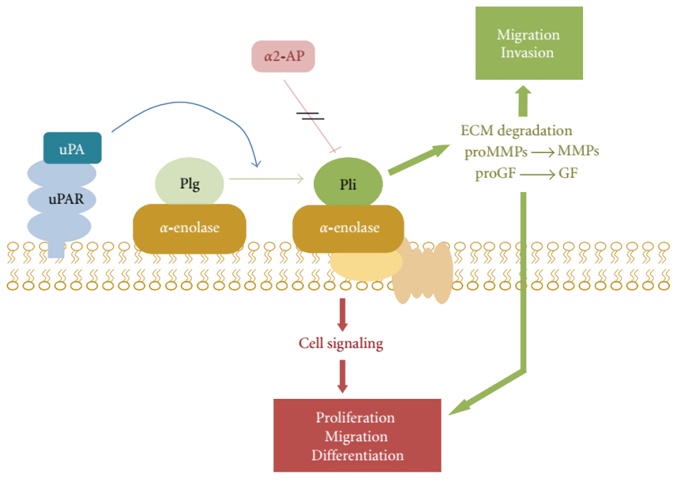NAA Services for Anti-Enolase α
Enolase α is a critical glycolytic enzyme in the catabolic glycolytic pathway and enolase α autoantibody has been reported involved in many infections and diseases. After years of endeavor and researches, Creative Biolabs has successfully developed improved natural autoantibodies (NAA) platforms to provide a full range of anti-enolase α biomarker services for our worldwide customers. Our professional team, high-end technologies, and years of experience will aid advantages for you to get a milestone development in your NAA researches.
Background of Anti-Enolase α Antibody
Enolase α, also known as enolase 1, is a key glycolytic metalloenzyme that catalyzes the conversion of 2-phosphoglycerate to phosphoenolpyruvate, which is the last steps of the catabolic glycolytic pathway. Enolase was firstly discovered from muscle extracts in 1934 by Lohman and Mayerhof. Actually, α-enolase is a multifunctional protein ubiquitously present in almost all human tissues. α-enolase serves as a glycolytic enzyme when localizing in the cytoplasm within cells, while acts as a plasminogen receptor when expressed on the surface of several cells.
Large numbers of studies demonstrated that antibodies against α-enolase (anti-α-enolase) have been detected in a large variety of infections, inflammatory and autoimmune diseases. Due to exclusively involve in diverse diseases, anti-α-enolase antibody may be useless to the diagnosis of a specific autoimmune disease but might serve as a prognostic marker for better definition of differential diagnosis in inflammatory disorders.
 Fig.1 Schematic overview represents α-enolase/plasminogen interaction on the cell surface. (Díaz-Ramos, 2012)
Fig.1 Schematic overview represents α-enolase/plasminogen interaction on the cell surface. (Díaz-Ramos, 2012)
The Role of Anti-Enolase α Antibody in Celiac Disease
Celiac disease is a type of autoimmune disease that primarily affects the small intestine. It is actually a problem with foods containing gluten, which is a protein triggering an abnormal immune response. This abnormity subsequently leads to inside small intestine damage and nutritional absorption disorders. Researches have been performed that several NAAs involve the immune response of the celiac disease. Anti-α-enolase association with celiac disease has been researched, and higher titers were showed in patients with celiac disease than healthy individuals. And anti-α-enolase antibody might be one of a potential marker of celiac disease diagnosis.
What We Can Do for You about NAA?
NAA is a group of autoreactive antibodies without any stimulation that can be detected in the sera of healthy humans and animals. Aided by our well-established platforms and experienced scientists, Creative Biolabs has bent ourselves in NAA studies for decades of years. Now, we are able to provide a wide spectrum of NAA products, applications and comprehensive NAA services, which including but not limited to:
Anti-α-enolase is a typical autoantibody of thousands of researched NAA. Creative Biolabs has successfully offered a full range of related services to many global clients and helped them get satisfactory results. You can directly contact us and communicate your specific demands with us for more information. We believe that our high-quality services and professional teams must offer you satisfactory strategies.
Reference:
- Díaz-Ramos, A.; et al. α-Enolase, a multifunctional protein: its role on pathophysiological situations. Journal of Biomedicine and Biotechnology. 2012, 2012: 156795.
Related Services:
- NAA Services for Anti-Transglutaminase 2 Antibodies (ATG2A)
- NAA Services for Anti-Transglutaminase 3 (TG3) Antibodies
- NAA Services for Anti-Factor XIII Antibodies
- NAA Services for Anti-Actin Antibodies
- NAA Services for Anti-Calreticulin Antibodies
- NAA Services for Anti-Gangliosides Antibodies
- NAA Services for Anti-Collagens Antibodies
- NAA Services for Anti-Synapsin I Antibodies
- NAA Services for Anti-Zonulin Antibodies
- NAA Services for Anti-Cardiolipin Antibody
- NAA Services for Anti-ATP Synthase β Chain

